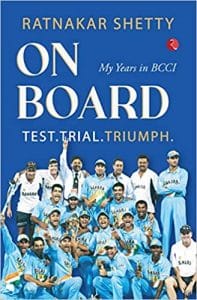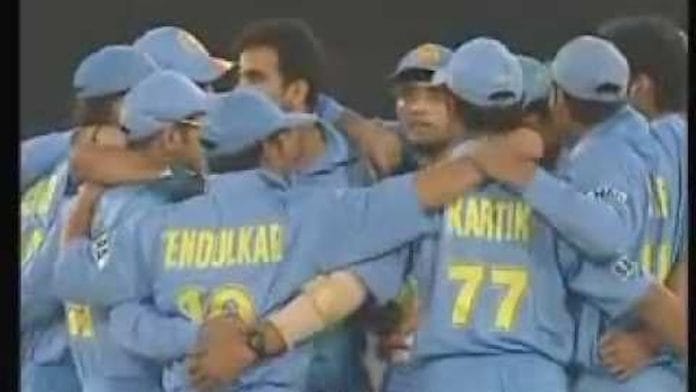India was due to tour Pakistan for a full series in early 2004. However, the spectre of terrorism loomed large and threatened to play spoilsport. The Kargil conflict between the two nations had taken place less than five years previously, and therefore cynics were convinced that the series would be
called off. From a commercial point of view, a cancellation would have been bad news, as every series between the traditional rivals is a guaranteed blockbuster and money-spinner. It all boiled down to the governments of the two countries, whose clearance was needed, when it came to bilateral series. The Pakistani government was willing but the Indian government appeared to be wary, and understandably so. India had extended a hand of friendship, only to be let down on multiple occasions.
Having said that, the government had no objections to cricket matches against Pakistan in ICC and Asian Cricket Council (ACC) tournaments.
Cricket lovers in both countries were delighted when Atal Behari Vajpayee, the prime minister of India, announced that his government was open to the possibility of a series between India and Pakistan. The last Test series between the two teams on Pakistani soil in 1989–90 had been drawn 0-0 and witnessed some impressive performances by players of both sides, but there had also been a couple of unsavoury incidents. A spectator had run onto the field during the first Test at Karachi and attacked K. Srikkanth, the Indian captain. The intruder was apprehended, but not before he had torn a couple of buttons off Srikkanth’s shirt. The tour went on only because the Indian team management chose to treat the incident as an aberration.
Read More: India vs Pakistan isn’t about the cricket anymore. It’s just hype and jingoism
Later on in the tour, an ODI at the same venue had to be called off due to the unruly behaviour of the spectators. We in the BCCI did not want to take any chances in 2004. Senior government officials were consulted and it was decided to send a reconnaissance team to Pakistan. This team comprised Yashovardhan Azad, a senior IPS officer, Amrit Mathur, who had accompanied the team as the media manager on a couple of tours, and myself. Mr Azad had managed the security on Prime Minister Vajpayee’s visit to Islamabad for the SAARC Summit in 2003, as well as some of President A.P.J. Abdul Kalam’s trips overseas. He had also supervised the security arrangements of the Pakistani team on its tour of India in 1998–99.
The three of us flew to Lahore, where we had a preliminary meeting with Mr Shaharyar Khan, the president of the Pakistan Cricket Board (PCB) and a distinguished former foreign secretary in his country’s government. He was also the first cousin of Mansoor Ali Khan Pataudi, our former captain. We also met Ramiz Raja, the former Pakistan captain and CEO of the PCB.
We proceeded to Islamabad, the capital, where we met Mr Shivshankar Menon, the Indian high commissioner, and sought his advice. We then visited Rawalpindi, Islamabad’s twin city and one of the probable hosts. In Karachi, our next destination, we were surprised to see people lining the streets on either side and holding posters bearing the images of Vajpayee and Pervez Musharraf, the president of Pakistan. Their message was loud and clear.
We subsequently visited Peshawar, Multan and Faisalabad. In every city, top officials of the Pakistani Army and Police briefed us on the security and travel arrangements which would be in place for the Indian team. We travelled extensively through the country, mostly by air and also by road and saw quite a bit of Pakistan. The high commissioner quipped when we met him again in Lahore, just before returning to India, that we had probably seen a lot more of Pakistan than many Pakistanis themselves! He had come to Lahore to participate in the city’s traditional kite-flying festival, which is quite a spectacle. The kites are affixed to fine metal wires and flown, and contests are celebrated by firing gunshots in the air.
The final meeting of the trip, at the PCB’s HQ in Lahore, was attended by officials of Pakistan’s interior ministry. We were assured that the security arrangements for the Indian team would be equivalent to those provided to a head of State.
We then returned to India and Mr Azad submitted our report to the Home Ministry.
Apparently, the Muttahida Qaumi Movement (MQM), a political party which was in power in Karachi, was keen to host a Test match in the port city and had even requested Shri L.K. Advani, our deputy prime minister and a resident of Karachi in his formative years, to put in a word. However, after our reconnaissance trip, we had come to the conclusion that both Karachi and Peshawar should be hosting ODIs, that too during the day, and not Test matches. Both cities were
known to be volatile and we wanted our players to spend as little time there as possible. A couple of years previously, a bomb explosion in Karachi, in the vicinity of the hotel in which the New Zealand team had been staying, had resulted in the termination of that series.
Our recommendation that the Tests be played at Multan, Lahore and Rawalpindi, and the ODIs at Karachi, Rawalpindi, Peshawar and Lahore, was agreed upon. The PCB also accepted our request that the ODIs be played before the Tests.
Also read: India’s distance with Pakistan and Bangladesh growing. Cricket can help
Even as the planning was on, there were some stories doing the rounds that members of the Indian team, which was then in Australia, were concerned about their safety and hence hesitant to tour. The players were then briefed at length and Mr Dalmiya, the Board president, gave them the option to skip the tour if they had concerns. However, all the players declared themselves available. It was decided that the cricket team would be accompanied by the reconnaissance team. I was appointed the manager, Amrit Mathur was named the media manager and Mr Azad was one of two officials assigned to oversee the security arrangements.
We assembled in New Delhi a day before our departure and were briefed by officials of the Home and External Affairs ministries on the protocols which we had to follow, on the tour. The
Prime Minister’s Office (PMO) had planned a detour for us before we flew to Lahore the following day. We were to meet the prime minister himself at his residence before proceeding to the airport. I received a fax from the PMO, which mentioned the names of all those whose entry into the prime minister’s official residence had been ‘approved’. Interestingly, the PMO had struck off the names of
S.K. Nair, the BCCI secretary, Jyoti Bajpai, the BCCI treasurer and Rajeev Shukla, the
BCCI vice president, from the list. The officials in question were not pleased one bit, but there was nothing that could be done. The name of S. ‘Ramky’ Ramakrishnan, the team’s video analyst, had been left out from the list which the Board had sent to the PMO for approval, and the poor guy had to sit in the bus and while away his time outside the prime minister’s residence, as a result.
The prime minister spent nearly an hour with the team. We gifted him a bat autographed by the players and I told him about our reconnaissance trip and the banners we had seen in Karachi. In his address to the team, he emphasized the need to win hearts. ‘Khel bhi jeeto aur dil bhi
(Win the game and also, the hearts),’ he said. Just as we were preparing to take his leave, he asked the naval band to play ‘Hum honge kaamyaab’ (We shall overcome). He wished us luck and the players in turn promised him that they would do their best, on and off the field. They kept their word.
 This excerpt from ‘On Board: Test. Trial. Triumph’ by Ratnakar Shetty has been published with permission from Rupa Publications.
This excerpt from ‘On Board: Test. Trial. Triumph’ by Ratnakar Shetty has been published with permission from Rupa Publications.






